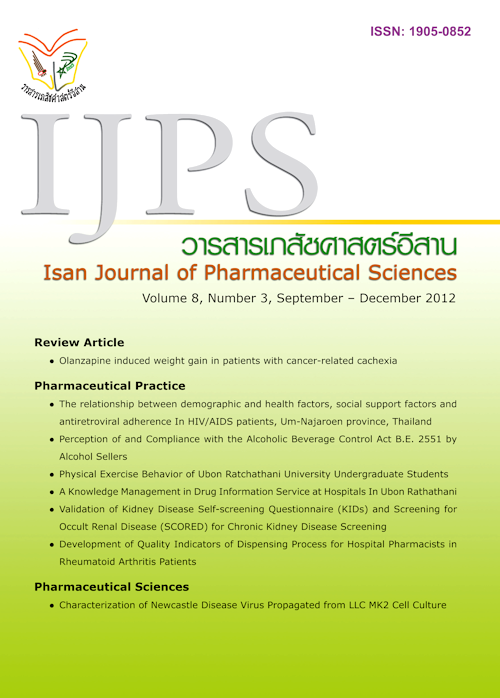การทดสอบความถูกต้องของแบบสอบถามที่ใช์ในการคัดกรองความเสี่ยง ในการเกิดโรคไตเรื้อรัง
Main Article Content
บทคัดย่อ
บทนำ: โรคไตเรื้อรังเป็นปัญหาทางสาธารณสุขที่สำคัญระดับโลก ทำให้เกิดโรคไตวายเรื้อรังระยะสุดท้าย โรคระบบ หัวใจและหลอดเลือด และการเสียชีวิต การคัดกรองโรคและรักษาผู้ป่วยตั้งแต่ระยะแรกเป็นสิ่งสำคัญที่อาจทำให้ลดจำนวนผู้ป่วย ไม่ให้เกิดภาวะแทรกซ้อนดังกล่าว วัตถุประสงค์: เพื่อทดสอบความถูกต้องของแบบสอบถามที่ใในการคัดกรองความเสี่ยง ของโรคไตเรื้อรัง Kidney Disease self-screening questionnaire (KIDs) และแบบสอบถาม Screening for Occult Renal Disease (SCORED) วิธีการศึกษา: เก็บข้อมูลในประชาชนทั่วไปที่เข้ามารับบริการตรวจสุขภาพประจำปี ณ โรงพยาบาล มหาสารคาม โรงพยาบาลลำปาง และโรงพยาบาลกาฬสินธุ์ จำนวน 775 คน โดยตรวจระดับ ซีรัมครีเอดินีน และโปรตีนใน ปัสสาวะโดยใช้แถบตรวจ และทดสอบแบบสอบถามโดยเปรียบเทียบพื้นที่ใต้กราฟ (AUC) ของ receiving operating curve (ROC), ค่าความไว ความจำเพาะ, positive predictive value (PPV), negative predictive value (NPV) ผลการศึกษา: แบบสอบถาม KIDs มีค่าความไว 66.7% ความจำเพาะ 78.2% PPV 7.8% NPV 98.8% ค่า AUC 0.709 (0.579-0.838) แบบสอบถาม SCORED มีค่าความไว 23.8% ความจำเพาะ 95.5% PPV 5.8% NPV 97.9% พื้นที่ใต้กราฟ (AUC) เท่ากับ 0.655 (0.533-0.776) สรุปผล: แบบสอบถาม KIDs มีค่าความไวสูงกว่าและในขณะที่แบบสอบถาม SCORED มีค่าความ จำเพาะสูงกว่า และต้องทำการศึกษาในกลุ่มตัวอย่างที่เป็นตัวแทนของชุมชนและขนาดของกลุ่มตัวอย่างที่มากขึ้นจึงจะสามารถ สรุปได้ว่าแบบสอบถามใดสามารถนำมาใช้คัดกรองโรคไตเรื้อรังในประเทศไทย รวมถึงควรศึกษาในเรื่องต้นทุนอรรถประโยชน์ ของการคัดกรองโรคไตเรื้อรังโดยใช้แบบสอบถามด้วย
Article Details
กรณีที่ใช้บางส่วนจากผลงานของผู้อื่น ผู้นิพนธ์ต้อง ยืนยันว่าได้รับการอนุญาต (permission) ให้ใช้ผลงานบางส่วนจากผู้นิพนธ์ต้นฉบับ (Original author) เรียบร้อยแล้ว และต้องแนบเอกสารหลักฐาน ว่าได้รับการอนุญาต (permission) ประกอบมาด้วย
เอกสารอ้างอิง
Bang H, Vupputuri S, Shoham DA, et al. SCreening for Occult REnal Disease (SCORED). Arch Intern Med 2007; 167: 374-381.
Boulware LE, Jaar BG, Tarver-Carr ME, Brancati FL, Powe NR. Screening for proteinuria in US adults: a cost-effectiveness analysis. JAMA 2003; 290(23): 3101-14.
Chirawatkul A. Biostatics for health science research. Khon Kaen: Faculty of Public Health, Khon Kaen University; 2004. [In thai].
Kerdchantuk C. Appropriate screening tool to identify undiagnosed chronic kidney disease in primary care [Ph.D. Thesis in Pharmaceutical Care]. Khon Kaen: Khon Kaen University; 2008.
Eknoyan G, Lameire N, Barsoum R, et al. The burden of kidney disease: improving global outcomes. Kidney Int 2004; 66: 1310–1314.
Go AS, Chertow GM, Fan D, McCulloch CE, Hsu C. Chronic kidney disease and the risks of death, cardiovascular events, and hospitalization. N Engl J Med 2004; 351: 1296–1305.
K/DOQI Clinical Practice Guidelines for Chronic Kidney Disease: Evaluation, Classifi cation, and Stratifi cation. Am J Kidney Dis 2002; 39(suppl 2): S1-246.
Krol E, Rutkowski B, Czarniak P, et al. Early Detection of Chronic Kidney Disease: Results of the Pol-Nef study. Am J Nephrol 2009; 29: 264–273.
Levey AS, Atkins R, Coresh J, et al. Chronic kidney disease as a global public health problem: Approaches and initiatives – a position state-ment from Kidney Disease Improving Global Outcomes. Kidney Int 2007; 72(3): 247-59.
Ong-ajyooth L. Screening and early evaluation of kidney disease Thai-SEEK project. [Online] 2009 Aug 26 [cited 2009 Sep 25]. Available form: http://www.nephrothai.org/nephrothai_boffice/im-ages_upload/news/181/files/seek%20opt.pdf.
Sumaili EK, Nseka NM, Lepira FB, et al. Screening for Proteinuria and Chronic Kidney Disease Risk Factors in Kinshasa:A World Kidney Day 2007 Study. Nephron Clin Pract 2008; 110: c220–8.


